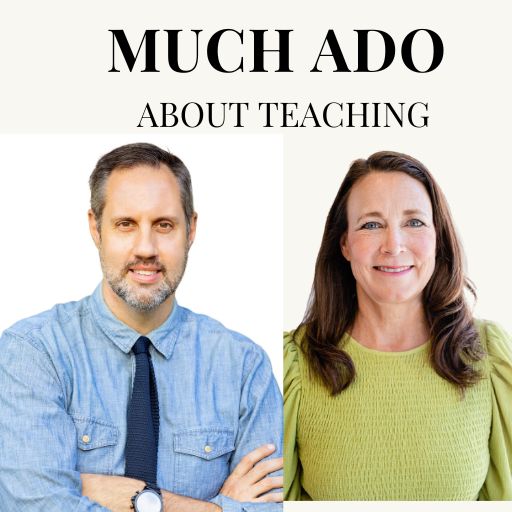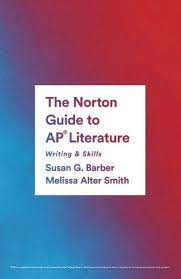We talk about the AP Lit exam on day 2 of class (day 1 is always some high-interest poetry activity). Here’s what I say:
This class is all about the exam, and this class is not at all about the exam. We will live in this dichotomy all year. You will have the opportunity to become a better reader, writer, and thinker; skills you will carry with you throughout life. You will also have the opportunity to consider different perspectives which if you are willing to open your mind will allow you to learn about others as well as yourself. We will learn with each other and from each other and become a sort of family. The texts we read and the work we will do with them will potentially be life-changing. This class is so much more than an exam.
But at the end of the year, if I have not prepared you for the AP Lit exam, I have not done my job. Many of you need this credit for a variety of reasons. I promise this class will not be all test, but I will provide you with the resources you need to be prepared for the exam. What you choose to do with them and how hard you work is up to you.
This class is all about the exam, and this class is not at all about the exam.
And then we don’t really talk about the exam for a while. We spend our time reading closely, thinking deeply, and learning how to writing well. Now, however, we are getting closer to the exam (I have 12 more classes before exam day – insert gif of a person breathing into a paper bag here). We are all in different places and have different students in front of us. I will not pretend that I know how everyone should review for the exam (or even how I should conduct review – ha). So I am giving you resources upon resources for you to chart your path forward. Use what you can, make copies (don’t ask for access – just make a copy and credit the correct person), tweak to your needs, and let the exam review fun begin.
The Basics
Exam Basics – This is part of a slide deck that I use during APSIs to introduce people to the exam. I also go over the basic exam construction with my students after spring break just to be sure they know the format. The less surprises on exam day, the better. Slides 10 – 14 offer multiple choice activities to use in class. Slides 16 – 20 are test taking strategies.

Multiple Choice:
Multiple Choice Practice Activities – Eric Rovie
FRQ1 – Poetry:
Poetry Annotation Video – Brian Hannon, 2019 Reader Reflection “The Landlady”, “The Landlady” Analysis video – Eric Rovie, Poetry Essay Review
FRQ2 – Prose:
2018 Reader Reflection (Zenobia) Susan Barber and Adrian Nester, Prose Review Zenobia Adrian Nester, Anne Lutz Fernandez shared these online lessons: Analyzing Relationships, Narrator’s attitude, Characterization, Experience

FRQ3 – Open Ended Question:

FRQ3 Reading Reflection (Idealism)
Review Activities for Q3: Literary 3×3, Walking Through Prompts, AP Lit Bingo, Terrific Three (NMSI resource), Speed Dating Prompts, Brian Sztabnik FRQ3 ESsay tips
General Resources and Strategies:

Thesis Statement Video, Line of Reasoning Video, Characterization Video, Figurative Language Video, 3×3 Annotation Guide, Questions and Stems for Writing, Last Minute Reminders
Gina Kortuem has several resources on her site APLitandMore.com and has given permission to share:
AP Daily Video Note Handouts, to go along with AP Daily videos, Multiple Choice Tips & Strategies, Discussing Complexity in AP Lit, AP Lit Skill Spotlights (if you need to zero in on a certain skill), Line of Reasoning brainstorming sheet, Open response question prompts, Open response titles list. She also has a few items on her Teachers Pay Teachers: AP Lit Test Prep Bundle , AP Lit Essential Skills Activities bundle, On-Demand writing strategies for AP Lit
FINALLY . . .
Aaryn Snow Birchell shared this on the FB page and I LOVE it and couldn’t agree more – We always start each test prep activity with a short guided breathing and a mental mantra of “I am excited to show what I know!” We need to help our kids train that neuropathway in their brains that will set up their brains to be successful!
And Carlos Escobar, my non-social media friend who I cannot tag, knows how to encourages students by saying,
“We cannot stress enough the value of you: the value of your words, the value of your interpretation. That’s what we want to hear. This is a very empowering process. The AP English Literature exam is an opportunity for you to tell the world what you know, what you see, and what you think. And we just can’t wait until you test, so we can delve into the brain of yours and we can grow and thank you for it.”
“This AP exam is giving you an opportunity to make an argument, to tell us: ‘Teacher/professor/Mr./Ms./Dr. So-and-So, it doesn’t matter than I’m only 16, 17, 18 years old. I’ve read this text, and I have something to say.’ And then, you have the evidence to back that up.” – Carlos Escobar

Susan Barber teaches AP Lit at Midtown High School in Atlanta, Georgia. Susan also serves at the AP Lit College Board Advisor. In addition to reading, writing, and investing in the next generation, she loves watching college football with her family especially when Alabama is playing.













One comment
Jennie
Thank you, thank you, thank you! These are wonderful. Know that your generosity and professional know-how has helped this newish AP Lit teacher tremendously!